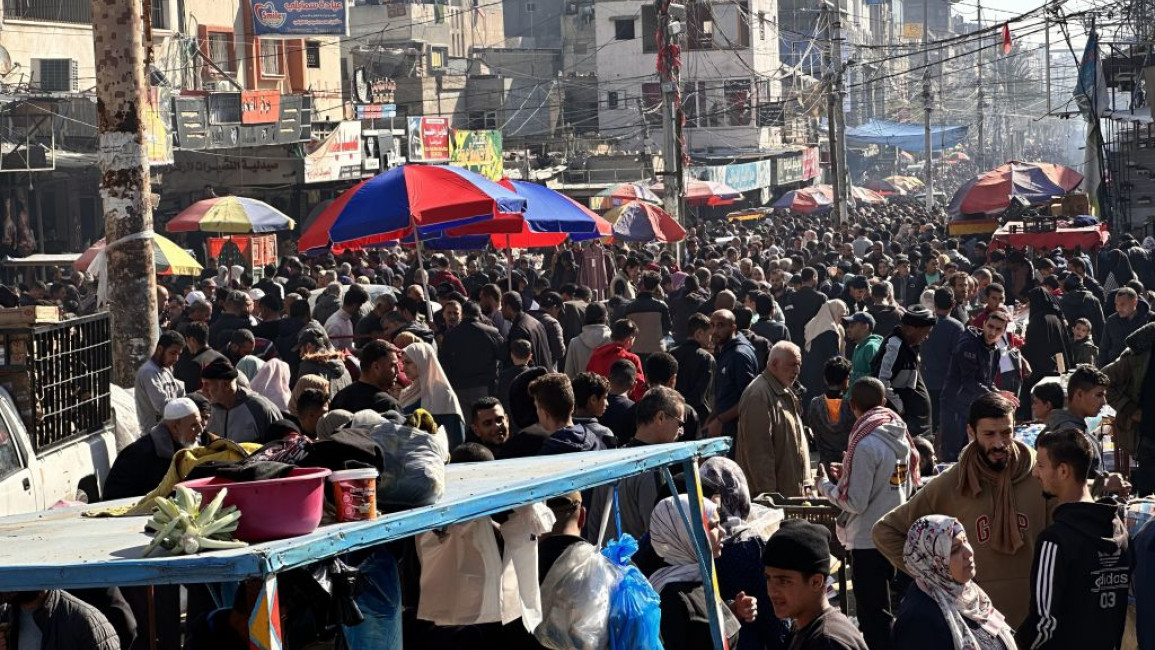Black market flourishes as Palestinians struggle to survive Israel's war on Gaza
As Israel continues its war on Gaza, the black market has flourished in the besieged coastal enclave, furthering the vulnerability of Palestinians amid a lack of food and essential goods.
Speaking to The New Arab, Palestinians in Gaza say that the black market has increased their daily personal and financial struggles as they try to survive this indiscriminate war by Israel.
As soon as the sun rises, countless displaced people and residents of southern Gaza rush to the market to buy what they can, but they often leave these markets empty-handed because they cannot afford the soaring prices.
"Because of the unreasonable prices, I can barely buy a few vegetables and some meat for my children," Mohammed al-Ashram, a displaced man, remarked to TNA.
"We are displaced people forced to leave our homes and flee without being able to take anything with us. We did not take our money or possessions," the 45-year-old father of five added. "The merchants here treat us as tourists, not displaced and poor. They think we possess huge wealth and must spend it here."
Poultry, meat, vegetables, fruits and other goods are among the commodities witnessing a pronounced price increase since Israel's launch of the war more than two months ago.
Before 7 October, Palestinians in Gaza used to buy one kilo of tomatoes for US$0.3; now, each kilo has become US$1.5. Oranges were previously sold per kilo at US$ 0.1; today, the price has reached US$3 for each kilogram of orange. As for poultry, Gazans used to buy one chicken for US$4; presently, they have to pay more than US$15 for one chicken.
Since 7 October, Israel has been conducting an indiscriminate war on the Gaza Strip after the Islamic armed movement Hamas launched an unprecedented surprise attack against the Israeli towns, settlements and bases around the Strip. The attack killed at least 1,130 Israelis, military and civilian, and captured around 250. Meanwhile, Israeli attacks have killed more than 19,500 Palestinians, mostly women and children, and wounded more than 50,000, according to the health ministry in Gaza.
Israel also imposed a "total siege" on the coastal enclave, preventing food, fuel, medicine and other goods from entering. After international and Arab pressure, Israel allowed a limited number of trucks loaded with humanitarian aid, including food, to enter the Gaza Strip.
But what makes the matter more ominous for the Palestinians in Gaza is that they can hardly "obtain food aid entering the Gaza Strip" via the Rafah land crossing, forcing the vast majority of the population to rely on local markets to buy their daily necessities.
In the city of Rafah, south of the Gaza Strip, considered a so-called "safe zone" by Israel, hundreds of small stalls containing various food commodities arrived in the Gaza Strip as part of humanitarian aid.
Huda al-Shawa, a displaced woman, said she has not received any aid since she arrived in Rafah four weeks ago.
"I am forced to buy food from local markets at crazy prices," the 39-year-old mother of four said to TNA. "We live in a cycle between the struggle to stay alive and the burden of obtaining basic materials."
"I thought I was lucky to have found our home to live in Rafah, but because of the difficult life circumstances, I cannot live as I want. Everything is difficult and exhausting," she added. "Sometimes, I wish I had died in an Israeli bombing instead of experiencing this daily suffering that I did not expect, not even in my nightmares."
The woman wondered who could be held accountable for this further suffering in absence of any government oversight of what is happening in local markets since Israel launched its war on all of Gaza.
Every day, Yasser Bashir, another displaced person who is sheltering in a UNRWA school in the city of Khan Yunis, waits for more than two hours in a long line to receive his share of daily food aid, but every time he receives "a small amount of food that is not enough for just one person."
"They (UN organisations) deliberately humiliate us, and we do not get enough food or even water. In return, we are forced to buy it from the black market," the 54-year-old father of eight remarked to TNA.
"I don't have any money to buy these goods from the local markets. My family and I are starving. Often, we sleep hungry without being able to eat anything," he said.
Human Rights Watch accused Israel of using starvation as a weapon in its war against Gaza by closing the crossings and preventing the continuous arrival of food aid to the Strip.
Officially, the United Nations Relief and Works Agency for Refugees (UNRWA) oversees the delivery of aid to Gazans, but it warns that the quantities arriving to the Strip do not meet the needs of the population.
The UN organisation said in a statement that the residents of Gaza are trapped between the Israeli war, the siege and complete deprivation of the basic needs to live, adding that "the continued violent bombing launched by Israeli forces on the Gaza Strip, the imposition of access restrictions and limited humanitarian supplies hinders them from assisting the local population."



